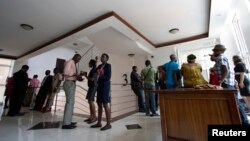Human Rights Watch has condemned a recent Ugandan court ruling against lesbian, gay, bisexual and transgender (LGBT) activists, whose workshop on rights advocacy was broken up two years ago by the government. HRW says the ruling is part of a pattern of intimidation of activists.
In February 2012, Uganda’s Minister for Ethics and Integrity, Simon Lokodo, stormed into a human rights workshop run by gay and lesbian activists in Entebbe and shut it down.
The organizers sued Lokodo, arguing that the workshop was intended to develop advocacy and leadership skills. But on Wednesday Uganda’s High Court ruled against the activists, saying Lokodo had acted in the public interest by protecting Ugandan moral standards.
Neela Ghoshal of Human Rights Watch says the decision could have worrying implications for public health in Uganda, and strikes a serious blow against freedom of speech.
“It essentially shuts down freedom of expression and freedom of assembly for LGBT people, and it also calls into question whether perhaps even distributing condoms to LGBT people could be considered illegal. The judge has made quite a stretch, and essentially drawn the conclusion that even talking about LGBT rights is a criminal activity and that the government has a right to shut that down," said Ghoshal.
Uganda’s Anti-Homosexuality Act, which formally outlaws “promotion” of homosexuality, was signed into law in February.
Earlier this week the Ugandan government issued a statement saying that Western governments had misunderstood the act, and that it was not intended to persecute gay people or prevent civil society groups from doing their work.
Ghoshal says the official position on gay rights in Uganda seems to be contradictory.
“On the one hand you have the government putting out this statement, probably in reaction to decisions by the U.S. and by other donors to revoke some funding to Uganda. But at the same time the courts are essentially sending the opposite message that any speech about gay rights is illegal. We have people who have been arrested, people who have been evicted from their homes, people who have been turned away from health care on the basis of the Anti-Homosexuality Act," said Ghoshal.
Despite widespread international condemnation, the Anti-Homosexuality Act is popular with Ugandan citizens.
The judges decision, says Ghoshal, may be based on a political agenda.




